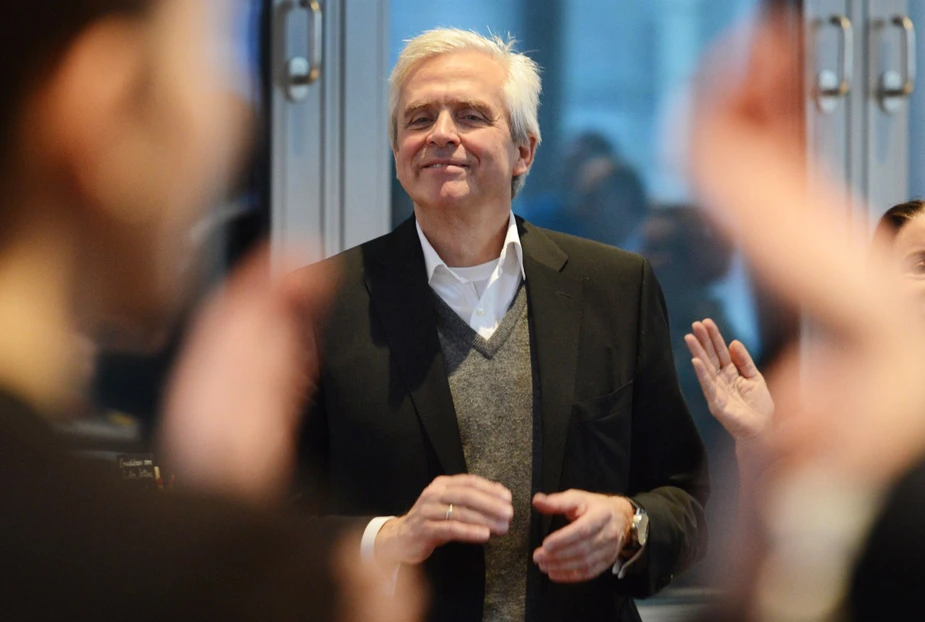Every Farewell is A New Beginning
The future plans of Hardy Rudolf Schmitz, past managing director of WISTA-MANAGEMENT GMBH
Hardy Rudolf Schmitz was project manager at Boston Consulting, a consulting company, he was managing partner of CompuNet Computer AG, and, for 14 years, managing director of WISTA-MANAGEMENT GMBH. Now the 65-year-old is going into retirement. At least he might…
Are you looking forward to retirement? Do you think you can ‘do’ retirement?
I’m not sure yet if I can ‘do’ retirement. However, before I started at WISTA, I was able to enjoy a sabbatical. It very much agreed with me back then. I took up singing and prepared for running a marathon.
What will you get up to with your newly gained freedom? Do you already have plans?
At first I will stay in close contact with WISTA because I’m still part of some projects as an advisor. Above all I am looking forward to spending more time with my family. Especially since it’s currently growing and I will have a third grandchild soon. Besides that I will continue my activities as a business angel and devote more time to the start-ups I am involved in. I will also be part of a conference called “Falling Walls Venture” which is dedicated to showcase the best start-ups from scientific institutions on the international stage.
You have many plans…
…and I haven’t even mentioned the largest chunk: a citizen action group that I belong to is currently founding the “InterK(ult)uranstalten Westend”, a group for the early vocational and intercultural integration of refugees. As the group’s chairperson, this will be a challenging task. Our aim is to turn the landmarked, but disused old hospital in Eschenallee into a meeting place for refugees, local residents, and artists. We are planning an intercultural café with a wide range of voluntary work including intercultural learning and languages, a large hall for intercultural events, and a workshop where newcomers can acquire and expand skills with local residents.
It seems like your family might not see you so often after all…
…yes, they will. We will spend many days together in our sanctuary, an old village school in the Uckermark.
Is there something special you feel you could finally do?
I will go back to singing in a choir. Now that I had the chance to improve my tenor, I am hoping that I can use my voice more.
Are you happy about your legacy in Adlershof?
I wish everything had progressed at a faster pace. But apart from that we have created a site with more than 1,000 high-tech companies in close vicinity with outstanding scientific institutions that is unique in Germany and hard to find in the rest of Europe.
In your view, what was the most important project in that time?
I didn’t play a part in it, but I would say the decision to relocate the institutes of Berlin’s Humboldt-University to Adlershof – as an engine of the new and the young. And the fact that the site now enjoys such substantial support from politicians and citizens and is viewed favorably throughout.
Are there things you are dissatisfied with?
The fact that Adlershof is still considered as this village in the middle of nowhere – although this is by no means true considering our city’s size and Adlershof’s outstanding transport accessibility. Often people in California and Tel Aviv know more about what’s been created here than people in Spandau. We should have started earlier to increase the density in the middle of the campus. More housing will now create a buzzing around-the-clock campus.
What will you miss especially?
My morning drive past the “Adlershof. Science at work.” sign. The claim is symbolic for how far this site has come and proves those wrong who thought it was impossible.
Do you have favorite spot in Adlershof?
Several. The top of the tower at Rudower Chaussee 19 and the view it offers of the site. And the Aerodynamic Park between the engine test bed and the tailspin wind tunnel with its very special atmosphere.
What are your wishes for the future of the site?
That Adlershof will be considered an important international engine for digitalization and the internet of things in about five years time. Sophisticated hard and software will be molded into intelligent applications and lead to significant economic gains.
…and wishes for your own future?
I hope that I will continue to have the energy for a long time to be involved in all these developments – or at least witness them. We live in a great city and a fascinating time with big challenges – from technological changes to the challenge of integrating refugees.
The interview was conducted by Chris Löwer for Adlershof Journal
